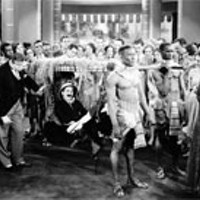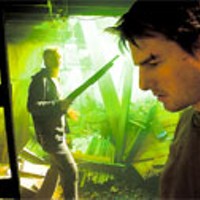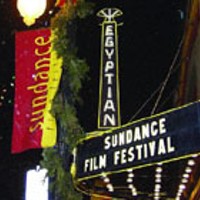

The most obvious aspect of this year's festival, however, was the increase in crowds and marketing. Many companies realized they had a captive audience of light-headed (from the altitude and alcohol) consumers, and each gave away something really useful, like free lip balm with corporate logos or drinks like a Targetini (I'm not making this up). There were at least six corporate-sponsored events at any given hour, and each one hosted some star getting a bag of swag -- as if Paris Hilton needs more garbage.
Luckily, filmmakers took the marketers to task this year. The award-winning Super Size Me documents filmmaker Morgan Spurlock's experiment in eating nothing but McDonald's for 30 days. Spurlock intercut dialogue on the dangers of mass marketing junk food consumption with shots of his progression from healthy young man to a near-victim of liver failure, and he makes a good case for McDonald's being responsible for our country's expanding girth.
The Corporation by Mark Achbar and Jennifer Abbott furthers the critique of the corporatization of the world. It has been edited down from a three-hour film to an easier-to-watch two hours since its debut at the Toronto Film Festival. The film notes that laws treat corporations as individuals, but if you apply behavioral science to the actions of corporations, we would find them to be less than stellar citizens. The Corporation is a timely critique of corporate society in the wake of many scandals. Having won the Audience Award for World Documentary at Sundance, it should be distributed soon.
Writer/director/actor Shane Carruth best exemplified the indie aesthetic with his low-budget feature Primer. Shot on an ultra-low budget with Super 16mm film, Primer is about a young group of engineers who are onto some kind of invention, but they aren't sure what it is, and neither is the audience. Just when you think you can't take any more of the techno-geek jargon, they make one tweak that changes not just the nature of their lives but might possibly change the entire world. With superb editing and a smart script, Carruth fashions a non-temporal narrative (think Pi meets Memento) that messes with your mind; it garnered two festival awards, including the Grand Jury Prize.
Another low-budget sensation was Jonathan Caouette's Tarnation, which claims to be the first feature film completely edited on Apple's free iMovie program. It reportedly cost only $268.50 to make. A hybrid video diary, personal documentary and experimental narrative, the film combines 20-odd years of home movie footage to craft a truly mesmerizing picture.
The fare wasn't all serious. Sundance featured many crowd-pleasing comedies, but the humor was often dark. Napoleon Dynamite follows the tribulations of Napoleon Dynamite (Jon Heder), an Uber-geek protagonist trying to make it through high school in Idaho, in spite of his family, friends and high school enemies. Saved! (directed by Brian Dannelly) takes a more wicked -- but just as funny -- look at high school, but this time the school is like a super-Christian theme park where the loners and outcasts are the only ones who make sense. Starring Jena Malone, Mandy Moore, Heather Matarazzo and Macaulay Culkin, this Heathers-inspired film had audiences holy-rolling in laughter.
Documentaries have increasingly become the best part of the independent film landscape, and this year was no exception. David Sampliner and Tim Nackashi focus their nonfiction piece Dirty Work on the lives of three people with less than glamorous jobs -- a bull semen collector, a restorative artist at a funeral home and a septic tank cleaner. What begins as a gross-out novelty becomes an in-depth look at the value of work and the people behind the jobs we'd prefer not to think about.
Other stellar documentaries this year included Born Into Brothels (Ross Kauffman and Zana Briski), about the children of Calcutta's red-light district; Deadline (Katy Chevigny and Kirsten Johnson), centering on former Illinois Gov. George Ryan's surprise decision to commute the sentences of 142 Death Row prisoners to life imprisonment; and Farmingville (Catherine Tambini and Carlos Sandoval), about a Long Island community's reaction to the killing of two Mexican day laborers in the light of increasing anti-immigration lobbying. Each of these documentaries was amazing, but perhaps the most engrossing was Jessica Yu's In The Realms of The Unreal. Yu's animated masterpiece focuses on the life of Henry Darger, who died and left behind a 15,000-page novel and hundreds of paintings of a war in an invisible world inhabited by orphan children. Darger has been accused of being deranged and possibly a pedophile (his paintings feature many nude young children), but Yu focuses instead on the artistry of the work, trying to bring his visions to life through animation. Yu makes a strong case that behavior that would be considered merely eccentric among the upper classes was deemed crazy because Darger was poor, and she argues that his work should be valued for its artistic merits.
A combination of documentary and fiction was used by filmmaker Kevin Willmott in CSA: The Confederate States of America. Willmott imagines what the world would look like if the South had won the Civil War -- and fashions his entire film as a faux-television presentation of a documentary from Britain on the history of the US post-war, complete with commercial breaks and news updates.
CSA was just one of the African-American films to make a splash at Sundance this year. Rodney Evans impressed audiences and won a special jury prize for Brother To Brother, about a gay black artist who finds himself back in the time of the Harlem Renaissance, where he learns a lot about community and the black artists who preceded him. Vondie Curtis Hall premiered Redemption, based on the life of Stan "Tookie" Williams, founder of the Crips street gang who became a Nobel Prize nominee. This made-for-TV film (it will air on FX) is brought to life so expertly by Jamie Foxx that it should at least see a limited theatrical release.
In Mario Van Peebles' BaadAsssss!, the director depicts his father Melvin Van Peebles and the difficulties he encountered making Sweet Sweetback's Baadasssss Song in 1971. A stunning tribute to early 70s black cinema -- and a reminder of the independent spirit behind so much of film history -- it represents the quintessential Sundance movie. With only 25 percent representation at the festival, black filmmakers still have a long way to go for equality in cinema, but they represent the true heart of Sundance: as creators of visionary films made against all odds, competing with hundreds of others for a little recognition.
Brian Newman is executive director of IMAGE Film & Video Center in Atlanta.



